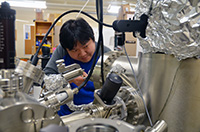Jan 13 2016
Headed by TeYu Chien, a UW assistant professor in the Department of Physics and Astronomy, researchers from the University of Wyoming have found that applying voltage can alter the mechanical properties of nanomaterials.
 TeYu Chien, a UW assistant professor in the Department of Physics and Astronomy, UW Photo)
TeYu Chien, a UW assistant professor in the Department of Physics and Astronomy, UW Photo)
It was found that nanomaterials experience a change in their fracture toughness when subjected to an electric field, such as those used in state-of-the-art electronic devices. The first observed evidence, this research helps to open the way for more studies into nanomaterials regarding electric field-mechanical property interactions. This knowledge is extremely helpful for applications and fundamental research.
Published in Scientific Reports, Chien is the lead author of the paper titled “Built-in Electric Field Induced Mechanical Property Change at the Lanthanum Nickelate/Nb-doped Strontium Titanate Interfaces.” Researchers from the University of Arkansas, University of Tennessee and Argonne National Laboratory in Argonne, Ill have also contributed to the research.
The surfaces of the fractured interfaces of ceramic materials such as lanthanum nickelate and strontium titanate with a fraction of niobium were analyzed in the study. Strontium titanate fractured differently within a few nanometers of the interfaces, when compared to the strontium titanate away from the interfaces.
The two ceramic materials were chosen due to one being a metallic oxide and the other was a semiconductor. Chien informed that when these two materials come into contact, an intrinsic electric field will be automatically formed in a region, known as the Schottky barrier, near the interface. The Schottky barrier is a region where an intrinsic electric field is generated at metal/semiconductor interfaces.
The presence of an intrinsic electric field at interfaces is an inevitable phenomenon whenever one material comes into contact with another material. The impact of the electric field on a material’s mechanical properties is not a subject of intense research especially in the case of nanomaterials. However, the effects of the electric field are an important to be understood for applications of nanoelectromechanical system (NEMS). These devices integrate mechanical and electrical functionalities on the nanometer scale, for instance, actuators.
In order to fully control the device performance, it is essential to gain knowledge about the electric field effects on the mechanical properties of NEMS materials create in nanoscale. The observations in this study start to provide a better understanding of the mechanical properties of nanomaterials.
The electric field changes the inter-atomic bond length in the crystal by pushing positively and negatively charged ions in opposite directions. Altering bond length changes bond strength. Hence, the mechanical properties, such as fracture toughness. The whole picture is this: The intrinsic electric field in the Schottky barrier was created at the interfaces. This then polarized the materials near the interfaces by changing the atomic positions in the crystal. The changed atomic positions altered the inter-atomic bond length inside the materials to change the mechanical properties near the interfaces,”
TeYu Chien, UW Assistant Professor